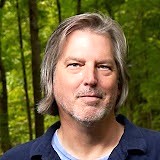Can anyone concisely propose a theory of systems change?
Wayne McMillan

This is an answer by Nate Hagens from a Linkedin question asked by a person concerned about the climate and environmental crisis the world is facing.
“ Here’s my small insight, which is hard fought and unlikely to be popular:
“ The way we are living today as individuals – 8 billion of us – doesn’t represent ‘who we are’ or ‘who we are capable of becoming’ as human beings. Our current system emerged from our particular biology: curious, ambitious, intensely social apes, who spread out
around the world after climate warmed/stabilized to allow certain tribes to turn to agriculture and storing surplus. These tribes ‘out-competed’ other hunter gatherers with respect to surplus, population, and material growth. This dynamic continued and exploded with discovery of stored dense carbon energy, and was boosted again with the power concentration from money as a social contract, and is now reaching its nadir with AI+big data combining and turbocharging everything into a mindless, hungry, economic superorganism.
“ The result is a ‘living’ metabolic entity running 24/7 at a constant (and growing) rate of 19TW of power. This entity is not ‘humanity’. This organism built, over time, with billions of micro-decisions, is in reality quite devoid of humanity (but is also immune to ‘voting’ or individual restraint).
“The metabolic requirements of this global economic superorganism now indicate a clear path dependency. We are in financial, complexity and ecological overshoot. Growth is now required to avoid economic disaster and its continuation is tightly tethered to energy, materials and degrading ecosystem functionality. Viewed from this vantage, it becomes clear the time for “reform” is long past we are not a mere few tweaks and policies away from a stable state (more like 30%+) which implies huge, dynamic upheaval and change. The only way out will be through. That is bending, not breaking, will be the order of the day. And that will take multiple simultaneous efforts at different scales plus emergence of lots of as-yet-unidentifiable creative responses.
“One of core (unspoken) implications of ‘The Limits to Growth’ and other studies is that we cannot yet predict complex systems we CAN model up to the point when a phase shift begins but not beyond. My recommendations in regard to systems change’ are:
1) understand the system;
2) become clear on your values and what’s important to you;
3) simplify your life;
4) prioritize your mental and physical wellbeing and social networks;
5) join others in strategizing beyond nominal, feelgood tropes;
6) in millions of ways, change the initial conditions of future moments;
7) when new conditions arrive, begin plans/actions to change the initial conditions of still further future moments.
“The Economic Superorganism is not humanity’s destiny. It was a period we had to go through. The mitochondria of what comes next is being birthed right now. Multiple paths to wildly different systems lay ahead.
“I invite you to play a role in the coming systemic changes. “
In summary, Nate understands that we are facing a complex, multidimensional polycrisis straddling many disciplines. He does tend to see our problematic dilemma from a systems theory perspective. In his writings and podcasts he highlights and identifies the urgent need to look at the biological, ecological, anthropological, political, psychological, social and economic dimensions of this crisis. His realisation is that there are no easy solutions and that this crisis is highly problematic. However he is aware that there are critical entry points for strategic intervention that we must endeavour to leverage to bring about any meaningful change.
Further commentary: https://www.thegreatsimplification.com
 Nate Hagens is the Executive Director of The Institute for the Study of Energy & Our Future (ISEOF). Allied with leading ecologists, energy experts, politicians, and systems thinkers, ISEOF assembles roadmaps for understanding how human societies might adapt to lowerthroughput lifestyles. For eight years, Nate taught Reality 101, an honors course at the University of Minnesota. He is coauthor of the books Reality Blind: Integrating the Systems Science Underpinning Our Collective Futures, Vol. 1, Independently Published, 23 June 2021 and The Bottlenecks of the 21st Century, Independently Published, 2 September 2019 and continues to develop educational materials and media around energy, the economy, and the environment. Nate has appeared with broadcasters like PBS, BBC, ABC, and NPR, and frequently lectures around the world.
Nate Hagens is the Executive Director of The Institute for the Study of Energy & Our Future (ISEOF). Allied with leading ecologists, energy experts, politicians, and systems thinkers, ISEOF assembles roadmaps for understanding how human societies might adapt to lowerthroughput lifestyles. For eight years, Nate taught Reality 101, an honors course at the University of Minnesota. He is coauthor of the books Reality Blind: Integrating the Systems Science Underpinning Our Collective Futures, Vol. 1, Independently Published, 23 June 2021 and The Bottlenecks of the 21st Century, Independently Published, 2 September 2019 and continues to develop educational materials and media around energy, the economy, and the environment. Nate has appeared with broadcasters like PBS, BBC, ABC, and NPR, and frequently lectures around the world.
Nate holds a master’s degree in finance with honors from the University of Chicago and a PhD in natural resources from the University of Vermont.






























